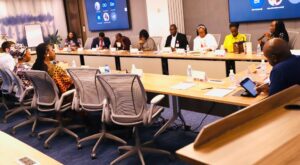ACIOE GENDER DIGITAL CONNECTIVITY ROUNDTABLE DISCUSSION

The digital gender gap, often termed the digital gender divide, highlights disparities in technology and internet access between different demographic groups. In Nigeria, this gap disproportionately affects girls and women due to challenges related to affordability, access, digital literacy norms, and safety and security. Gender stereotypes perpetuate the notion that technology is primarily for boys, discouraging girls from utilizing digital tools. Moreover, fears of discrimination further hinder women’s participation in the digital sphere.
Beyond access issues, the digital gender divide encompasses gender biases embedded within technology products, the technology sector, and digital skills education. This disparity is predominant among women who are older, less educated, impoverished, or reside in rural areas and developing nations. The intersection of the digital skills gap with issues of poverty and educational access exacerbates the challenges faced by marginalized women. Addressing the digital gender gap requires multifaceted approaches that tackle structural barriers and societal norms. By empowering girls and women with digital literacy skills, promoting inclusive technology policies, and challenging gender stereotypes, the drive can work towards bridging this divide and fostering a more equitable digital landscape.
ACIOE Associates, in collaboration from HerVest and support from the Bill & Melinda Gates Foundation (BMGF), convened a roundtable discussion to deepen the understanding of the structural barriers facing women in Nigeria. The discussion explored how these barriers might impact women’s digital usage. The insights gleaned from discussions surrounding the digital gender connectivity roundtable in Nigeria shed light on the complexities of this issue. They offered valuable perspectives for policymakers, educators, and advocates seeking to promote gender equality in the digital realm.
Through the roundtable, ACIOE Associates brought together key stakeholders, creating a platform for collaboration and strategic partnerships. Strategies were discussed to promote digital literacy, emphasize mentorship, scale advocacy, community engagement, intersectionality, women-centric-designed intervention programs, and equitable access across genders, as concerted effort is essential to create a more inclusive digital landscape that empowers all individuals to thrive.

